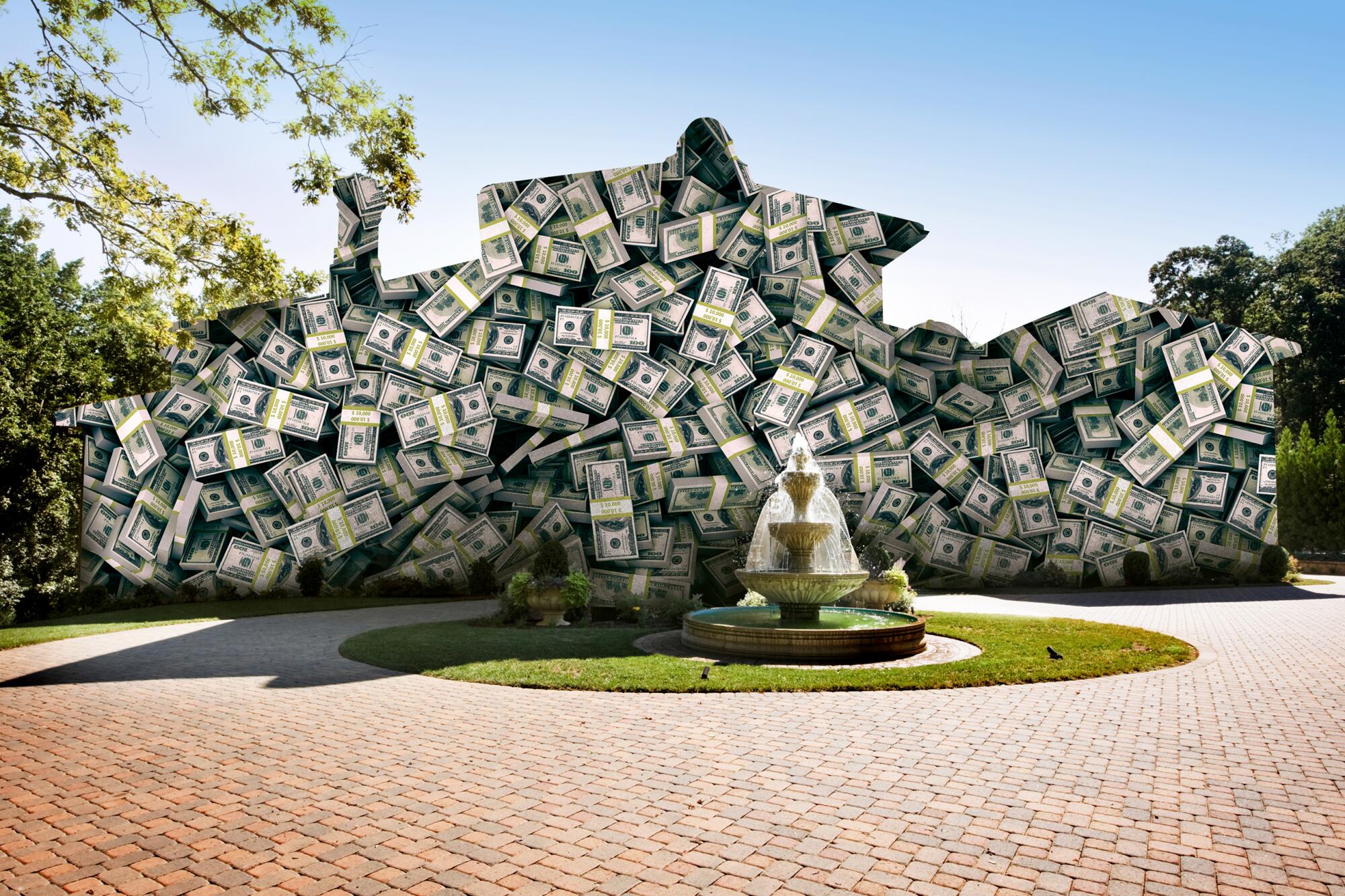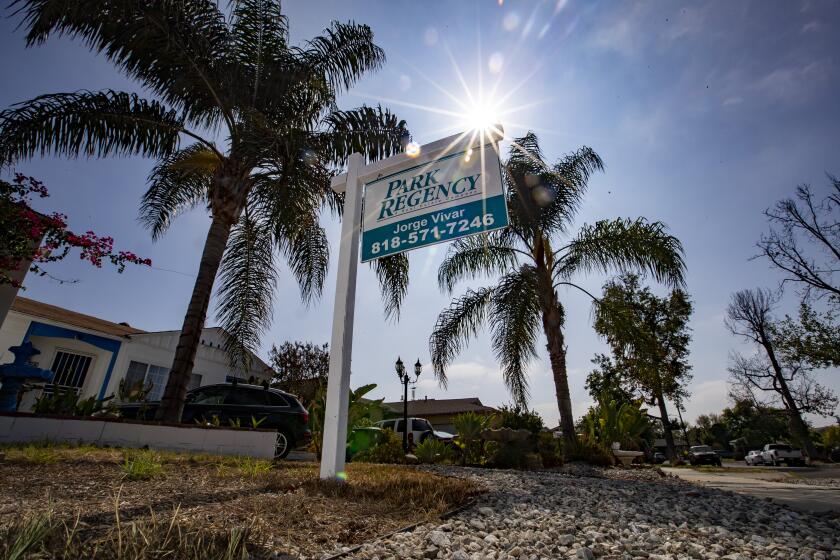
- Share via
Before Measure ULA took effect in April, some wealthy residents scrambled to avoid paying the new “mansion tax” that would fund affordable housing and homelessness prevention. Even celebrities known for their liberal ideals and humanitarian crusades happened to sell, for whatever reason, right before the tax went into effect.
As the mad dash became public, there was one question on many people’s minds. Why?
Even before voters passed the measure, bringing a 4% transfer tax on all property sales above $5 million and 5.5% on sales above $10 million in the city of L.A., attorneys and real estate agents began devising ways to shirk it. In the waning days of March, luxury homeowners made increasingly desperate attempts to sell their long-held properties before the deadline.
For outsiders to L.A.’s extravagant real estate scene, the numbers didn’t quite add up. Many sellers chopped the price of their home so low, or tossed in so many luxury goodies, that it would’ve been cheaper to simply sell at the original price and pay the tax. And some whose houses sold before the law took effect have spent many millions more on charity than the amount they saved in avoiding the tax.
But for insiders — those familiar with the fortunes amassed in this otherworldly housing market and the lengths people go to protect those fortunes — there was a clear answer: “the wealth defense industry.”
Where there is wealth, there are workers tasked with protecting it. Like moths to a flame, these accountants, consultants and attorneys have made careers out of helping the rich keep their riches.
“The thing that makes rich people different from you and I is they have a whole industry focused on helping them minimize their taxes,” said Chuck Collins, senior scholar at the Institute for Policy Studies, a think tank based in Washington, D.C.

Collins helped coin the term “wealth defense industry” with his 2021 book “The Wealth Hoarders: How Billionaires Spend Millions to Hide Trillions.” He said some of the best minds of this generation are working in the “wealth defense” space.
“The wealthy have plenty of tools at their disposal, and their advisors use trusts, offshore corporations and anonymous shell companies to take that wealth and put it out of reach,” he said.

Subscribers get exclusive access to this story
We’re offering L.A. Times subscribers special access to our best journalism. Thank you for your support.
Explore more Subscriber Exclusive content.
He added that when a Hollywood star known, say, for giving millions to charitable causes sells their mansion days before it would be subject to a tax, it’s likely a result of wealth advisors suggesting they sell it as a financial maneuver.
“Celebrities might be civically oriented people, but for advisors, tax avoidance is their bread and butter. It’s how they ensure their worth,” Collins said. “They can say: ‘I saved my client this many millions in taxes,’ and they wear that banner around their neck.”
One financial advisor, who spoke on the condition of anonymity, said people come to him because he’s developed a reputation among the wealthy for helping clients avoid real estate taxes. Nothing illegal; simply bending the tax code in their favor.
Shortly after Measure ULA passed in November, real estate agents said their inboxes were flooded with emails from accountants and attorneys offering solutions to avoid the tax.
In December, Walsh Investment Real Estate Associates published a video titled “AVOID the LA City Mansion Tax.” In April, Ervin Cohen & Jessup LLP ran an article titled “Nine Ideas to Avoid the Effect of Measure ULA.”
After a white-hot March, L.A.’s luxury real estate market ground to a halt in April when Measure ULA kicked in, leaving the city with less money than originally projected.
While it’s impossible to know why any particular individual decided to sell when they did, there was a deep irony that the great March sell-off saw plenty of Hollywood elites in the mix — many of whom have their own charities and dedicate millions of dollars toward other causes.
Brad Pitt, for instance, has donated millions through multiple foundations over the years, including having pledged $5 million to Katrina refugees and sending $1 million to Doctors Without Borders after the 2010 Haiti earthquake. He sold his Hollywood Hills home for $39 million in the last days of March. By doing so, he avoided a $2.145-million tax bill.
Mark Wahlberg, who founded the Mark Wahlberg Youth Foundation, unloaded his Beverly Park mega-mansion for $55 million in February, saving $3.025 million in taxes by selling it before April 1.
Other big names whose real estate deals avoided the tax include Colin Farrell, who sold his Los Feliz villa to a YouTuber for $5.25 million in March, and “Big Bang Theory” star Simon Helberg, who hauled in $7.8 million for a 1930s Spanish Colonial-style retreat. The deal closed on March 31, the day before the tax took effect.
Certainly other factors — such as rising interest rates and a souring market — might have compelled some homeowners to drop their prices and sell.
Endeavor CEO Ari Emanuel sold his traditional-style home near Brentwood Country Club in February for $14.5 million, staggeringly shy of his original asking price of $25.9 million.
By selling before April, he saved roughly $800,000 he would have owed under ULA. In May, The Times reported that Emanuel has made around $347 million in total pay over the last five years and donated millions to charity.

The publicists for these actors and high-profile executives did not return calls seeking comment or were unable to get a response from their client about why they sold properties when they did.
One reason some wealthy L.A. residents may prefer charity over taxation is that they can control where and how the money is spent.
“Tax is a democratic system where other people make decisions. Private charity is not accountable to anyone but you,” Collins said. “It gets into the mind-set of ‘Nobody should tell me what to do.’”
Kelly Phillips Erb, tax counsel at White and Williams LLP, added that some celebrities found charities specifically for the purpose of saving on taxes. By funneling money into a foundation, such as Bill and Melinda Gates, or a school, such as Kanye West, you can save on both estate taxes and income taxes.
It also allows the wealthy to have a more direct impact.
“Some people don’t want to give their money to Uncle Sam. They’d rather give it to a library or a college fund,” she said.
Sign up for This Evening's Big Stories
Catch up on the day with the 7 biggest L.A. Times stories in your inbox every weekday evening.
You may occasionally receive promotional content from the Los Angeles Times.
Many power players in L.A.’s luxury real estate scene have criticized the tax, pointing at the city’s inefficient spending and inability to address the housing crisis despite the hundreds of millions it has spent so far.
“The way to solve homelessness isn’t to spend $700,000 in tax dollars to build a single unit of housing,” said Jason Oppenheim of the Oppenheim Group. “Developers can build much more efficiently than the city, which has been incredibly wasteful.”
At some point, amassing wealth becomes more about score-keeping than enjoying the things it can buy, Collins said. Hypothetically, $30 million is enough: You can live well, never fly commercial, own multiple homes, travel wherever you like and secure a good life for your children. But some people always want more.
“The ultra-wealthy are thinking about multigenerational dynasty,” he said. “They look for a form of immortality with their name on a building or a private foundation.”
Under that mind-set, losing even 1% of your fortune can lower your score — and shorten the length and scope of your dynasty.
Southern California home prices declined by more than 10% from the peak last year, but now the declines could be over.
The reluctance of some to pay the tax will have short- and long-term effects. In the short term, the fire sales have put Measure ULA funds in limbo, forcing the city to put the brakes on spending money toward affordable housing and services for homeless people.
In the long term, if the accountants, attorneys and financial advisors employed by the rich can find ways to skirt the tax, revenue from the measure will be far shy of the $900 million annually that was originally projected.
Emmanuel Saez, a professor of economics at UC Berkeley, said he wasn’t surprised that some people sold their homes when they did specifically to avoid the tax.
“The tax is a step in the right direction, but it’s not sufficient to solve the problem of inequality,” Saez said.
He suggested a progressive tax with much higher rates on extreme wealth than the rich pay — such as plans proposed by Sens. Bernie Sanders and Elizabeth Warren — to curb the concentration of wealth.
Collins said the transfer tax is a way to address the disruption of L.A.’s housing market caused by people with too much money.
“Extreme concentration of wealth and the concept of real estate strictly as an investment leads to rising land value, rising costs and the middle class being unable to live in the area where they grew up,” he said.
His solution?
“Tax the bad: the real estate speculation, the excessive luxury housing,” he said. “Fund the good: permanent affordable housing in communities that need it.”
More to Read
Sign up for This Evening's Big Stories
Catch up on the day with the 7 biggest L.A. Times stories in your inbox every weekday evening.
You may occasionally receive promotional content from the Los Angeles Times.













